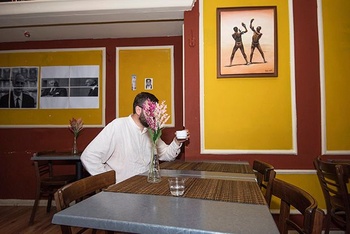There has been a socio-cultural community centre in the middle of Matongé for the past five years, where residents of the capital of African, Belgian, or other heritages can meet each other during cultural or educational events. Kuumba, which was founded by adventurer, Brussels-, and Congo-phile Jeroen Marckelbach, also has a cafeteria that opens every day at lunchtime. You can have a drink, and starting at around 3 pm, when Daisy opens the kitchen, get a bite to eat. In addition to the modest menu, the clientele also offers a varied, multicultural mix. There is plenty of space for everyone. At the bar, at the long communal table, at the smaller tables, or in the armchairs by the bookcase, which offers a selection of literature about Africa and Belgium’s colonial past. The decoration of the spacious café with its large front window ranges from traditional African art and photocopies of Luc Tuymans talking to Queen Paola at Bozar about his critical paintings about Belgium’s colonial past, to Belgian sports scarves. Despite the fact that Leopold II, Baudouin, and Lumumba appear in the same space here, there is a peaceful atmosphere on Vredestraat/rue de la Paix. Except perhaps from time to time in the small room at the back of Kuumba, which until the end of the month is housing the exhibition “Les tranchées en Afrique 1914-1918”, for which the Brussels-based Africa expert Lucas Catherine collected archival photos. They document the battles that Congolese soldiers in the service of Belgium fought against the German army in what is now Tanzania.
Kuumba, by the way, is Swahili for creativity. If you would like to learn more Swahili, Lingala, or Dutch, you can take classes at Kuumba. What’s more, the Flemish-African centre also organises concerts, debates, and film screenings.
FR ❙ En plein Matonge se trouve depuis cinq ans un centre socio-culturel où les Bruxellois originaires d’Afrique, de Belgique ou d’ailleurs peuvent se réunir autour d’événements culturels ou pédagogiques. Kuumba, fondé par Jeroen Marckelbach, aventurier amoureux de Bruxelles et du Congo, dispose aussi d’une cafétéria qui est ouverte tous les midis. On peut y prendre un verre et y manger un bout, à partir de 15 heures, quand Daisy ouvre sa cuisine. En plus de sa modeste carte, le lieu propose aussi à la clientèle un regard multiculturel varié. En tout cas, il y a assez de place pour tout le monde : au comptoir, à la longue table à partager, aux tables plus petites et aux fauteuils près de la bibliothèque qui présente une sélection d’ouvrages sur l’Afrique et sur le passé colonial de la Belgique. La décoration de ce vaste café aux grandes vitres va de l’art africain traditionnel à des photocopies de Luc Tuymans s’entretenant avec la reine Paola au sujet de ses tableaux critiques envers l’histoire coloniale belge, en passant par des écharpes de supporters. Bien que Léopold II, Baudouin et Lumumba soient rassemblés dans le même espace, il règne une atmosphère paisible ici, dans la rue de la Paix. À part quand même, pour le moment, dans la petite salle dont Kuumba dispose à l’arrière. Là est présentée jusqu’à la fin du mois l’exposition Les tranchées en Afrique 1914-1918, pour laquelle Lucas Catherine, spécialiste bruxellois de l’Afrique, a réuni des photos d’archives. Celles-ci montrent le combat que les soldats congolais ont mené pour la Belgique contre l’armée allemande sur le territoire de l’actuelle Tanzanie. Kuumba, by the way, ça veut dire « créativité » en swahili. Si vous voulez apprendre plus de swahili, le lingala ou le néerlandais, Kuumba peut aussi vous aider. Cette Maison africaine-flamande organise également des concerts, des débats et des projections de films.
NL ❙ In het midden van Matongé is sinds vijf jaar ook een sociocultureel ontmoetingscentrum te vinden, waar Brusselaars van Afrikaanse, Belgische of andere afkomst elkaar kunnen vinden rond culturele of educatieve evenementen. Kuumba, opgericht door avonturier en Brussel- en Congo-liefhebber Jeroen Marckelbach, heeft ook een cafetaria die elke middag open is. Je kunt er een glas drinken, en vanaf een uur of drie, wanneer Daisy de keuken opendoet, ook een stukje eten. Behalve de bescheiden menukaart biedt ook de klandizie een gevarieerde, multiculturele aanblik. Er is in ieder geval plaats genoeg voor iedereen. Aan de toog, aan de lange gemeenschappelijke tafel, aan de kleinere tafeltjes of in de zetels bij de boekenkast, die boeken over Afrika en het Belgische koloniale verleden in de aanbieding heeft. De decoratie in het ruime café met de grote vitrine gaat van traditionele Afrikaanse kunst, over fotokopieën van Luc Tuymans die koningin Paola in Bozar onderhoudt over zijn kritische schilderijen over het Belgische koloniale verleden, tot Belgische supporterssjaals. Hoewel Leopold II, Boudewijn en Lumumba zich hier in dezelfde ruimte vertonen, heerst er een vredig sfeertje in de Vredestraat. Tenzij in de kleine zaal achteraan, waar nog tot het einde van de maand de expo Loopgraven in Afrika 1914-1918 loopt, waarvoor de Brusselse Afrika-kenner Lucas Catherine archieffoto’s verzamelde. Die verbeelden de strijd die Congolese soldaten in Belgische dienst voerden tegen het Duitse leger in wat nu Tanzania is. Kuumba is overigens Swahili voor creativiteit. Ook als u nog meer Swahili, Lingala of Nederlands wilt studeren, kunt u in Kuumba terecht. Daarnaast organiseert het Vlaams-Afrikaanse huis ook concerten, debatten en filmvertoningen.
KUUMBA ●●●
Vredestraat 35 rue de la Paix, Elsene/Ixelles, 02-503.57.30, www.kuumba.be 7/7, 14 > 0.00

Fijn dat je wil reageren. Wie reageert, gaat akkoord met onze huisregels. Hoe reageren via Disqus? Een woordje uitleg.